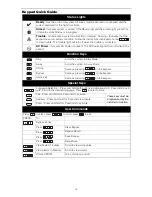
1
About Your Security System
Read this manual carefully and have your installer instruct you on your system's operation and
on which features have been implemented in your system. All users of this system should be
fully instructed in its use. Fill out the ’System Information’ page with all of your zone information
and access codes, and store this manual in a safe place for future reference.
NOTE:
Please consult your installer for further information regarding the false alarm reduction
features built into your system, as not all are covered in this manual.
Fire Detection
(must be enabled by Installer)
This equipment is capable of monitoring fire detection devices such as smoke detectors and
providing a warning if a fire condition is detected. Good fire detection depends on having an
adequate number of detectors placed in appropriate locations. This equipment should be
installed in accordance with NFPA 72 (N.F.P.A., Batterymarch Park, Quincy MA 02269). Please
read the Family Escape Planning guidelines in this manual.
Carbon Monoxide Detection
(must be enabled by Installer)
This equipment is capable of monitoring carbon monoxide detectors and providing a warning if
carbon monoxide is detected. Please read the Family Escape Planning guidelines in this manual
and instructions that are available with the carbon monoxide detector.
Testing
To ensure that your system continues to function as intended, you must test your system weekly.
Please refer to the ‘Testing your System’ section in this manual. If your system does not function
properly, call your installing company for service.
Monitoring
This system is capable of transmitting alarms, troubles, and emergency information to a central
station. If you initiate an alarm by mistake, immediately call the central station to prevent an
unnecessary response.
NOTE:
The monitoring function must be enabled by the installer before it can become functional.
NOTE:
This system has a communicator delay of 30 seconds. This function can be deleted, or it
can be increased up to a maximum of 45 seconds by the installer.
NOTE:
Ensure that your installer verifies that your system is compatible with the Central Station
Receiver format at yearly intervals.
Maintenance
With normal use, the system requires minimum maintenance. Note the following points:
• Do not wash the security equipment with a wet cloth. Light dusting with a slightly moistened
cloth should remove normal accumulations of dust.
• The standby battery shall be replaced every 4-5 years by service persons only.
NOTE:
Do not attempt to replace the battery or open the enclosure; there is a risk of electric
shock and/or fire.
• For other system devices such as smoke detectors, motion detectors, glassbreak detectors or
door/window contacts, consult the manufacturer’s literature for testing and maintenance
instructions.
General System Operation
Your security system includes an alarm control/keypad and various sensors and detectors. The
keypad is mounted by the main entry/exit location.
The security system has several zones of area protection. Each of these zones communicates to
a single wireless sensor (motion detectors, glassbreak detectors, door contacts, etc.) or to one
or more hard-wired sensors. A sensor in alarm is indicated by messages on the LCD.
Additional features include Automatic Inhibit (Swinger Shutdown) for Alarm; Tamper and Trouble
signals after 3 occurrences in a given set period; and a Programmable Keypad Lockout option.
For SIA CP-01 classified installations, the swinger shutdown feature is programmed such that
one or two trips will shut down the zone. The zone will be restored after a manual reset (by enter-
ing the access code at the time of disarming the alarm system) or it will be reset automatically
after 48 hours with no trips on any zones.
NOTE:
Only the installer or service professional should have access to the system.
Summary of Contents for PC9155-433
Page 23: ......






































